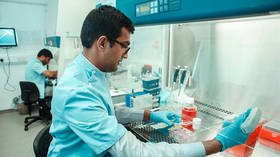Scientists closer to finding motor neurone disease cure after discovering how to repair damaged nerve cells – study

Researchers in Scotland say they have made a breakthrough in finding potential cures to motor neurone disease (MND) following their work on repairing the nerve damage caused by the degenerative illness.
In their study, published in the Acta Neuropathologica journal earlier this month, scientists at the University of Edinburgh outline their finding that damaged nerve cells could be repaired if the energy levels in mitochondria cells – which power motor neurones – are improved, potentially curing the deadly condition.
Dr Arpan Mehta, the lead scientist behind the study, said the team’s work “provides hope that by restoring the cell’s energy source, we can protect the axons and their connection to muscle from degeneration.”
The research opens the door for clinical trials that, if found to replicate the study’s results, could allow scientists to find appropriate and already approved drugs for use in human trials.
“Work is already underway to identify existing licensed drugs that can boost the mitochondria and repair the motor neurones,” Mehta said. “This will then pave the way to test them in clinical trials.”
Also on rt.com Brave battle against motor neurone diseaseCurrently, motor neuron disease cannot be halted or cured, although there are treatments to help patients manage their symptoms and have a higher quality of life. As the disease progresses, it causes worsening muscle weakness, resulting in loss of movement, and patients can lose the ability to speak, among other symptoms.
There is a 1 in 300 chance of being diagnosed with the disease, and while it can impact adults at any age, people over the age of 50 are more likely to be affected. More than half of those afflicted with the disease die within two years of being diagnosed, according to research cited by the UK’s Motor Neuron Disease Association.
If you like this story, share it with a friend!













